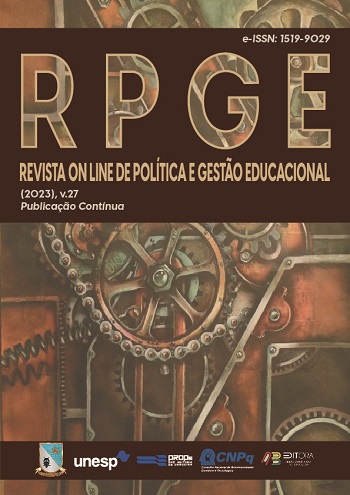The humanities in a technical university
From the transfer of knowledge to the formation of an educational and humanitarian space
DOI:
https://doi.org/10.22633/rpge.v27i00.18060Keywords:
Humanities, Motivation, Education, Personality formationAbstract
Nowadays, specialists must be alert in multicultural environments, able to realize and fulfill their creative potential, and constantly learn new skills. Recently, excessive specialization in education has led to a decrease in time spent teaching subjects of the social and humanitarian cycle. The article analyzes the motivation of students of technical specialties to study the humanities and the transformation of this motivation in various courses. To that aim, an empirical study was conducted based on the Moscow Polytechnic Institute. The research sample consisted of students of the Moscow Polytechnic Institute studying at two faculties – chemical technology and information technology. Considering the results, educators of the humanities should not only impart knowledge, but also set humanitarian, and cultural standards that encourage dialogue, not monologue, tolerance, conducting a historical and ethical analysis of a situation, and developing effective solutions that do not conflict with humanistic principles.
Downloads
References
BALGANOVA, E. Digitalization trends and risks professional education. Russian Journal of Education and Psychology, v. 12, n. 3, p. 19-31, 2021. DOI: 10.12731/2658-4034-2021-12-3-19-31.
BEZGODOV, D. N.; VOLOGIN, E. A.; SHILOVA, S. V. Philosophy as a basic discipline for technical areas of undergraduate and specialist studies. Higher education in Russia, v. 27, n. 3, p. 135-143, 2018.
BORODINA, T.; SIBGATULLINA, A.; GIZATULLINA, A. Developing creative thinking in future teachers as a topical issue of higher education. Journal of Social Studies Education Research, v. 10, n. 4, p. 226-245, 2019.
DONOHUE, D. Culture, cognition, and college: How do cultural values and theories of intelligence predict students’ intrinsic value for learning? Journal of Culture and Values in Education, v. 4, n. 1, 2020. DOI: 10.46303/jcve.2020.3.
GUSEVA, E. A.; PANFILOVA, M. I. On the discussion of university philosophy: what, how, why. Higher education in Russia, v. 28, n. 2, p. 69-78, 2019. DOI: 10.31992/0869-3617-2019-28-2-69-78.
HONEGGER, M. What Does “Education” Mean: Cultural Values in Educational Language. Journal of Culture and Values in Education, v. 3, n. 2, p. 42-53, 2020. DOI: 10.46303/jcve.2020.12.
ISAIKINA, M.; NEDOGREEVA, N.; POKOTILO, A. Role of metasubject educational results in learners’ professional self-consciousness formation. Russian Journal of Education and Psychology, v. 12, n. 3, p. 7-18, 2021. DOI: 10.12731/2658-4034-2021-12-3-7-18.
IVAKHNENKO, E. N.; KUZNETSOVA, N. I. On the benefits of rational simplicity: how to teach the humanities in technical universities? Higher education in Russia. n. 4, 2022. Available: https://cyberleninka.ru/article/n/o-polze-ratsionalnoy-prostoty-kak-prepodavat-gumanitarnye-distsipliny-v-tehnicheskih-vuzah. Access: 12 Dec. 2022.
IVYGINA, A.; PUPYSHEVA, E.; MUKHAMETSHINA, D. Formation of sociocultural competence among foreign students. Journal of Social Studies Education Research, v. 10, n. 4, p. 288-314, 2019.
KAYUMOVA, G. et al. Developing creative potential of a schoolchild by means of native language. Journal of Social Studies Education Research, v. 10, n. 1, p. 81-92, 2019.
KEEFER, N.; HAJ-BROUSSARD, M. Language in Educational Contexts. Journal of Culture and Values in Education, v. 3, n. 2, p. 1-12, 2020. DOI: 10.46303/jcve.2020.9.
KORABLEVA, O. N.; MITYAKOVA, V. N.; KALIMULLINA, O. V. Designing a decision support system for predicting innovation activity. Paper presented at the ICEIS 2020 - Proceedings of the 22nd International Conference on Enterprise Information Systems, v. 1, p. 619-625, 2020.
KOROTKEVICH E. R. Educational motivation of a modern student in the context of the theory of achieving goals. Educational resources and technologies, v. 3, n. 28, 2019. Available: https://cyberleninka.ru/article/n/uchebnaya-motivatsiya-sovremennogo-studenta-v-kontekste-teorii-dostizheniya-tseley. Access: 12 Dec. 2022.
KOSACHEVA, V. O. Motivation of students for learning and professional development. MNCO, v. 5, n. 96, p. 56-79, 2022. Available: https://cyberleninka.ru/article/n/motivatsiya-studentov-k-obucheniyu-i-professionalnomu-razvitiyu. Access: 12 Dec. 2022.
KUZNETSOVA, N. I. Unobtrusive pedagogy. Science as a public good: Sat. articles. Nauch. ed. and comp. L.V. Shipovalova, I.T. Karsavin: In 7 vols. M.: ROIFN, v. 7, n. 6, p. 88–91, 2020. Available: http://rshps.ru/books/congress2020t6.pdf. Access: 12 Dec. 2022.
LOBANOVA, Yu. V.; BAZHENOVA, N. V. Ethics of dialogue in modern education. Modern Science: Actual Problems of Theory and Practice. Series: Cognition, v. 5, n. 80, p. 129-131, 2018.
MEDVEDEVA, G.; MITINA, G. Professional development of higher education institutions pedagogical workers in the context of the federal project «New Opportunities for Everyone». Russian Journal of Education and Psychology, v. 12, n. 3, p. 32-47, 2021. DOI: 10.12731/2658-4034-2021-12-3-32-47.
MILOVANOVA, G. V.; KULYASHOVA, N. M.; SHEMYAKINA, E. Yu. Comparative analysis of motivational characteristics of students at different stages of education. Concep, v. 6, p. 122-143, 2022.
OTTS, E. V.; PANOVA, E. P.; LOBANOVA, Yu. V. A study of the long-term effectiveness of training in a pandemic. 2021
POGOSYAN, V. Institutional Reconstruction: Complete Alteration? In: Economic and Social Development ESD-2017 (Book of Proceedings). 25th International Scientific Conference on Economic and Social Development / 17th International Social Congress (Moscow, Russia, Oct. 30-31, 2017). Varazdin, Croatia: Varazdin Development and Entrepreneurship Agency, 2017. p. 931-936.
POGOSYAN, V. Updating social theory: Redefinition of modernization. Wisdom, v. 19, n. 3, p. 182-193, 2021. DOI: 10.24234/wisdom.v19i3.486.
SAENKO, N. et al. Understanding in the context of distance learning. In: TOROPOVA, E. V. (Eds.). Man, Society, Communication. European Transactions in the Social and Behavioral Sciences, 2021. DOI: 10.15405/epsbs.2021.05.02.98. v. 108, p. 772-778.
Published
How to Cite
Issue
Section
License
Copyright (c) 2023 Revista on line de Política e Gestão Educacional

This work is licensed under a Creative Commons Attribution-NonCommercial-ShareAlike 4.0 International License.
Manuscritos aceitos e publicados são de propriedade da Revista on line de Política e Gestão Educacional. É vedada a submissão integral ou parcial do manuscrito a qualquer outro periódico. A responsabilidade do conteúdo dos artigos é exclusiva dos autores. É vedada a tradução para outro idioma sem a autorização escrita do Editor ouvida a Comissão Editorial Científica.










